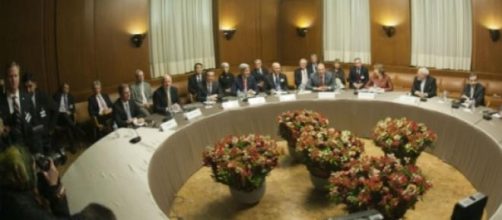The original deadline for the agreement had been set for March 31, but, as so often happens with talks between power houses, the negotiations went well beyond. However, following two extensive and almost certainly exhausting evenings spent at the table, the talks between the P5 + 1 and Iran finally came to an understanding. The US, UK, France, Russia, China plus Germany reached a landmark outline agreement with Iran which aims to ensure the country's nuclear programme remains peaceful.
The announcement was made following marathon negotiations in Lausanne, Switzerland, between the powers that be. The outline that was finally agreed upon by all sets out a basic plan that will see Iran reduce its stockpile of low-enriched uranium in addition to a reduction in its installed centrifuges by two-thirds. Further conditions have been agreed upon in principle regarding the general scaling back of the nuclear programme, and in return, the US and European Union have assured Iran that sanctions will be lifted gradually. The sanctions apply to the nuclear programme itself and these will be halted gradually and could be re-applied should Iran not fully comply with the conditions agreed upon.
The deal has been labelled 'historic' by US President Barack Obama. Iran's foreign minister, Javad Zarif thanked those who took part in the lengthy negotiation before highlighting that the US and Iran had spent years building a "mutual mistrust", he went to express his hopes of remedying the state of relations in time.
There is no doubt that the outline agreement reached is a landmark one, and seemed impossible just months ago. It was in August of 2014 that Iranian President, Hassan Rouhani, blasted the US for imposing further sanctions of the Middle Eastern country stating that the mistrust had been "further deepened" and that such behaviour was "not compatible with the atmosphere of negotiations". However, if one takes a closer look at relations between Iran and the US, it is not the first time their interests have aligned. Situations that have proved mutually beneficial to the countries have arisen in the past. Just recently in fact, the US and Iran have seen eye to eye with regards to the rise of the Islamic State, and while any partnership has remained a discreet affair, there is no doubt that both parties benefit from fighting on a single front.
The nuclear agreement certainly changes the dynamic, as it finally sits the two nations at the table and finds them in agreement over a very public issue. It will now be interesting to witness how the relationship between the US and Iran progresses from here on out, but there is no doubt that the current state of affairs is as good as it has been in recent memory. One need only think back to 2013, before the election of Hassan Rouhani. From 2005 to 2013, the President of Iran was Mahmoud Ahmadinejad, and during his time in power, relations between the US and Iran were perhaps the worst they had been for 20 years. Thinking back to that time leads one to realise that already, some quite incredible steps have been made in repairing a relationship that no so long ago, seemed well and truly broken.
© ALL RIGHTS RESERVED

